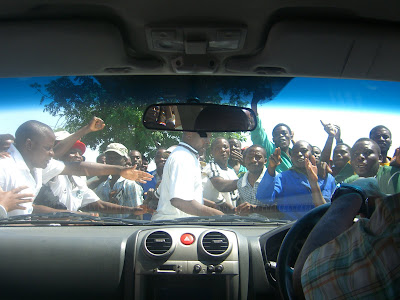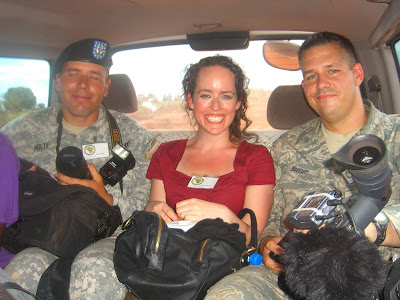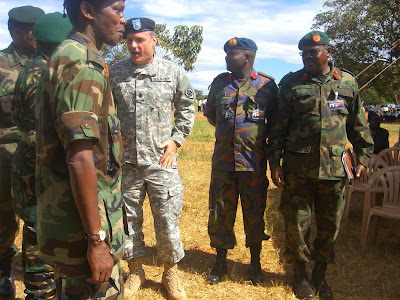Later in the flight, he pointed to a picture of Obama in a magazine I was reading. "Our hero," he said. He continued, "There is a separation here. The white people," gesturing to the passengers on the plane around us, "are full of pride. We hope the hero, I mean Obama, will take that away in the world."

Sunset at the airport in Lusaka, Zambia
I traveled next to Zambia to film and report on China's investment in the country's copper mines. Anti-Chinese sentiment may be stronger in Zambia than in any other part of Africa.
During our four hour drive from Lusaka, the capital, to Chambishi, the copper belt, we stopped in a town to get lunch. While I was in the car, a young boy, maybe 5 or 6 years old, came to my window, stretched his arms towards me and cupped his hands. An elderly man was holding on to the boy's shoulders; the man was blind, his pupils a light grey color, and the boy was leading him around. I hesitated before giving the boy money, but finally gave him $3 in change. Within moments a man ran towards the car, punched the boy several times in the face, and ran off with my money. The boy looked at me and began crying, but we had to drive away, because at that point other men were surrounding our car.
 A slum in Chambishi, Zambia
A slum in Chambishi, Zambia

A barber shop in Chambishi

Mr. Mokuka, our local guide in the copper belt, called me "dance." The word "shaneni" in Nyanja, a local language, means dance.

Mr. Mokuka standing in the graveyard of Zambian workers who died in an explosion of a Chinese-owned factory
Mokuka works in a copper mine, and he said the region had been hit hard by the economic recession. "When America sneezes, the world catches a cold," he said a few times during our trip.
Chinese-owned copper mines have provided much-needed job opportunities in the region. Mokuka captured the sentiment of many mine workers I spoke with during the trip when he said, "Chinese investment is here in a big way, but it does not translate into food on our tables."
"China was not part of the scramble for Africa in the 1900s," he went on, "The colonial masters took over our country, and we hate them for that. But the Anglo American companies paid us well. They built houses for the workers to live in. They provided health care...The Chinese are worse than the whites. They treat us like slaves. The Chinese come and reap and leave us in poverty."
I spoke with mine workers who were attending a Sunday church service, and many said they were beaten by their Chinese employers after protesting for vacation days and higher pay. "The British dehumanized us," one said, "Now the Chinese are doing the same." Another man who has worked for Chinese and Zambian state-owned mines said, "The Chinese have an inferiority complex. If we speak up to them, they think we are looking down on them. That we think the Chinese are inferior to westerners. So they beat us."

Attendees at the Zambia Pentecostal Church in Chambishi

The pastor's wife during the church service
Mokuka took me to a mine, shut temporarily by the company that owns it, where teenagers come everyday to steal copper.


 A young man who digs for copper in abandoned mines in Chambishi
A young man who digs for copper in abandoned mines in ChambishiThe men, many wearing no shoes when I met them, carve holes and caves with shovels, searching for copper which they sell for $20 a bag. "We dig with our hands," a 21-year-old named Steve said to me. "It's the only thing we know how to do. If I can't find copper, then I will go to the townships and steal." The caves sometimes collapse, and Steve told me more than 40 of his friends have died searching for copper.

 The men dig caves like this one to search for copper. The caves sometimes collapse, killing the miners.
The men dig caves like this one to search for copper. The caves sometimes collapse, killing the miners. As we filmed Mokuka said to me, "In Zambia we like to procreate. Many people have 8 or 9 kids and hope that one will redeem them, and then they are disappointed." He went on, "Many of these men come from broken homes. They have no where to go." I asked Mokuka if any women come to the mines to steal copper. He said some in the slums become prostitutes, and he sees girls as young as 13 walking the streets in the copper belt.
The most popular politician in the copper belt is Michael Sata, a former presidential candidate who plans to run for office again in two years. Most Zambians I spoke with expect Sata to be the next president. "This is Sata's territory," Mokuka said, "If the president came here to Chambishi he would be stoned."
I drove back to Lusaka to interview Sata, who is a fierce critic of Chinese investment. "The Chinese aren't investors, they are infestors!" he told me in the front yard of his home. Sata suggested that we visit the slums and the market together. "It will be good for video," he said.
We arrived at the outdoor market, and as people recognized him, a crowd of hundreds of supporters surrounded us. The people were screaming for him as Sata calmly made his way down the street.

Sata's six bodyguards beat people away violently to prevent them from touching us. Sata turned to me at one point and said, "There is a thin line between peace and violence. These people in the slums are very dangerous. They don't care if they die or don't die. One word can incite them."
After only a few minutes the crowd had grown so large that we tried to get in a car to leave. The mob surrounded our car and began rocking it back and forth, chanting "We want change! We want change!" and "I will die for you my father!"

Unable to leave in the car we convinced a bus driver to let us take over his bus to get back to Sata's offices. His bodyguards hung off the sides of the bus, pushing people away from the windows. Hundreds of Africans surrounded the bus during the mile long drive, chanting and singing songs of support. The mob forced police to shut down the main street of Lusaka, and the next day Sata and I appeared on the front page of the newspaper.

My Zambia producer told me that Sata knew if he took us to the market the large crowds would ensure he made the front page of the newspapers, and that the police would not interfere if an American television crew was filming. Sata said our walk through the market "was an act of provocation...a dare to the government."
That afternoon the Zambian government called our producer and asked us to stop filming until we informed them of the purpose of our trip. I was already on my way back to South Africa for a last day of filming before returning to Beijing.

With Eddie, a South African producer, and Sipewe, our driver in Johannesburg



































